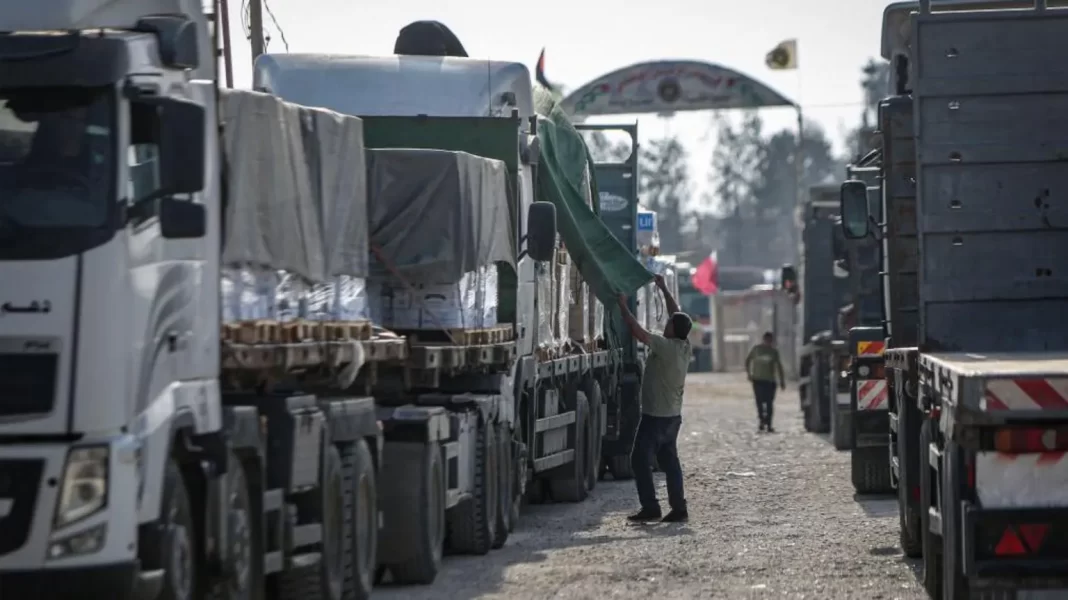Incident Overview
On Thursday, an Israeli airstrike hit an aid convoy in Gaza, resulting in the deaths of four Palestinians. The convoy, organised by U.S.-based aid group Anera, was carrying food and fuel to a hospital in southern Gaza. The relief organisation reported that four unarmed people were riding in the convoy’s lead car. Israeli authorities claimed “armed assailants” commandeered the lead vehicle, a charge Anera has refused to accept.
Understanding what happened
The convoy was on its way to deliver essential supplies to the Emirati Red Crescent Hospital in Rafah. The incident occurred shortly after the convoy crossed into Gaza through the Israel-controlled Kerem Shalom crossing. According to Anera, four local Palestinians took control of the lead vehicle, expressing concerns that the route was unsafe and prone to looting. They had not been vetted by Israeli authorities, but the convoy did not view them as a threat.
Israel Claiming the attack
The Israel Defense Forces (IDF) issued a statement saying that the lead vehicle had been taken over by “armed assailants” and that the airstrike was a response to this perceived threat. They stated that after confirming the presence of weapons, they targeted the vehicle in a precise strike.
Anera’s Response
Anera strongly denied Israel’s claims. The aid group insisted that no weapons were present in the vehicle, and the four individuals who were killed were not armed. Anera also mentioned that there was no warning or communication from the Israeli military before the airstrike. Despite the tragic loss, the rest of the convoy continued its mission and successfully delivered the aid to the hospital.
Background on the Israel-Gaza Conflict and recent conflict
The incident is part of the ongoing Israel-Gaza conflict, which has escalated in recent months. The conflict has deep historical roots, with tensions between Israel and Palestinian groups, particularly Hamas, the governing authority in Gaza.
The recent surge in violence began after a series of events, including tensions in Jerusalem and rocket fire from Gaza into Israel. In response, Israel launched airstrikes targeting Hamas and other militant groups in Gaza. The conflict has resulted in a significant loss of life, destruction of infrastructure, and a humanitarian crisis in Gaza.
The Humanitarian Crisis in Gaza
Gaza is facing severe shortages of food, water, and medical supplies due to the ongoing conflict and the blockade imposed by Israel. Hospitals are overwhelmed, and there is an urgent need for humanitarian aid. Organizations like Anera are working to provide relief, but the situation remains dire.
International Response
The international community has called for a ceasefire and for both sides to return to negotiations. However, the situation remains tense, with no immediate end in sight. Many countries and organisations are urging Israel to allow more aid into Gaza to address the growing humanitarian crisis.
Impact on Civilians
Civilians are bearing the brunt of the conflict. In addition to those killed in airstrikes, many have been displaced from their homes, and children are particularly vulnerable. The destruction of infrastructure, including schools and hospitals, has made life extremely difficult for the residents of Gaza.
Way Forward
The recent airstrike on the aid convoy highlights the dangers and complexities of delivering humanitarian aid in conflict zones. While both sides continue to exchange accusations, the need for a peaceful resolution to the Israel-Gaza conflict is more urgent than ever. The international community must work together to address the humanitarian needs in Gaza and push for a lasting peace.

